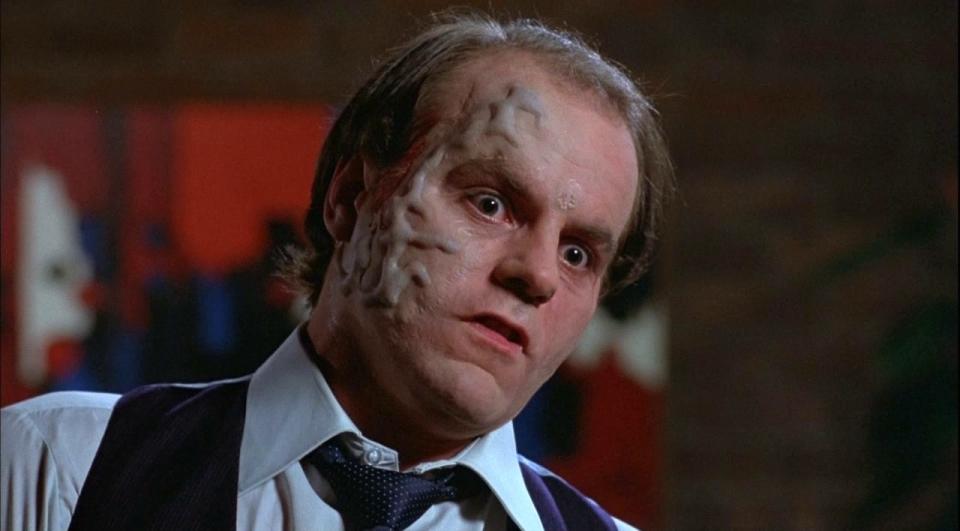Michael Ironside Remembers Narrowly Escaping the 'Scanners' Head Explosion Scene Unscathed

The eye-popping, brain-raining skull explosion in the early goings of David Cronenberg’s 1981 horror classic Scanners remains one of the most impressively executed movie deaths of all time. And the whole thing was way too close for comfort for veteran actor Michael Ironside.
To reset the scene: the dome-exploding man, credited as “First Scanner” and played by Canadian actor Louis Del Grande, intends to demonstrate his telepathic powers for a roomful of suits at the private security firm ConSec. He invites a “volunteer” from the audience, who turns out to be a “scanner” himself — and a very evil one at that, Ironside’s Darryl Revock — whose extra-sensory countermeasures leads to the iconic cranium combustion.
As detailed on the bonus features from the 2014 Criterion Collection release of the film, the scene was pulled off using practical effects, with filmmakers forgoing planned Pyrotechnics and creating a life cast of Del Grande’s head (including, per various reports, latex, wax, fake blood, hamburgers, pig bladder, chicken liver, and “gelatin brain”) that they then blew the hell out of with a shotgun.
As Ironside related to Yahoo Movies, the filmmakers initially planned for him to stay seated next to Del Grande, with only Plexiglas separating them, so that they could capture them both in what’s known as a “two-shot” (in addition to a close-up and cross-shot). “And I went, ‘Oh, no, no, no, no,’” Ironside laughed.
“I got real nervous because I didn’t want to blow the gig,” he recalled. After initially cast to play Revock only in the black-and-white flashback scene, Ironside was given an expanded role as the central antagonist after Cronenberg rewrote the script on the fly. The Toronto native, 29 at the time, was an unknown actor, and despite the increase in screen time was due to make just over $5,000 salary on the film. So he went to his agent.
“They said, 'Ask for some insurance.’ So I went back in and said, I want a million dollars insurance. And Claude Heroux, the producer, looked at me like I was out of my mind. 'For what?’ I said, 'You’ve gotta a guy with a shotgun, you don’t know what’s gonna happen.’ And he says, 'We can’t do that.’ So I said, 'Well I’m not sitting in there. I may never work again after this.’”

So Cronenberg killed the two-shot. And then this happened: “They blew the head and the pellet from the shotgun hit the Plexiglass and riddled the desk and chair where I was sitting,” he recalled. “I was so proud of myself for opting out of that. … Nobody was being evil or anything like that. It was just a whole bunch of people reinventing the wheel at that time. It was kind of like 'Wow, we didn’t expect that to happen. Good call, Michael.’”
Despite modest box-office success at the time of its release, Scanners has grown in stature in the decades since. The film not only launched Cronenberg (who went on to direct other favorites like Videodrome, The Fly, Dead Ringers, and A History of Violence) but also Ironside, who notes without a hint of bitterness that because of Canadian union agreements, he’s never received any residuals on the Montreal-filmed thriller. The 65-year-old Ironside has become a ubiquitous character actor, with well over 100 film credits to his name, including Top Gun, Total Recall, Free Willy, Starship Troopers, The Perfect Storm, The Machinist, and X-Men: First Class.
The signature head detonation wasn’t the only time Ironside found himself in harm’s way on the set of Scanners. He also revealed to us some secrets behind the film’s less iconic but equally as technically impressive final sequence in which his Darryl Revock (a character the actor says he modeled after Latin American revolutionary Che Guvera) and the film’s hero, kindhearted telepath Cameron Vale (Steven Lack), square off.
Ironside said production of the film wrapped around Christmastime 1979. But Cronenberg wasn’t thrilled with the movie’s climax, in which Darryl and Cameron mind-zap each other into oblivion, so he called in famed makeup artist Dick Smith (The Godfather, The Exorcist, Taxi Driver) to come on a consultant for reshoots. Smith was available because a dispute had shut down the production of his current job, the William Hurt-starring sci-fi thriller Altered States. They picked up filming again on Scanners in May 1980.
“Dick Smith and David got together and restructured the whole ending of the film using bladders, those things where you see the veins popping on my face and on Steven’s face,” he said. “They had never been used before. Dick Smith had developed those for Altered States, for William Hurt’s character, but hadn’t used them yet.”
They also introduced a “flame bar” that sat just below the camera at Ironside’s feet as the veins pop on his face using the bladders and his eyes turn completely white using Sclera contacts. With Smith off attending to Lack’s look, Ironside said the flame bar dried out his eyes, and then an assistant makeup artist scratched his corneas while removing the Scleras.
But the show had to go on, and Smith needed to improvise and find Ironside new, oversized, softer eyes. In Smith’s makeup kit were the blue eyes he fitted Dustin Hoffman with for his scenes as an old man in the 1970 drama Little Big Man, and those would end up being the very eyes Ironside wore for the film’s moment, after Revock and Cameron have melded into a singular being and he tells lead actress Jennifer O'Neil, “Kim, it’s me.”

Beyond that fun bit of trivia, and despite the treachery of the low-paid gig that’s lead to not a single residual, Ironside marvels at the work of his revered director, Cronenberg. The actor had no idea the head explosion would become such a phenomenon, or that Smith and Cronenberg’s late audibles would make for the perfect ending. But in retrospect the success and appeal of Scanners makes so much sense to him.
“We were hustling. That film was at a fever pitch,” he said. “But David was always this quiet respite in the storm of constant production that was going on in the film.
"I didn’t identify it until later on, after I had been in a few hit films. There’s something that happens when a director is firmly in charge and everyone trusts [him]… It’s not a conscious thing, I don’t know how to explain it. Not until I had been on things like Total Recall and Starship Troopers and Extreme Prejudice and stuff like that… It’s almost like, 'Daddy’s in charge,’ and everybody is comfortable. I realized that’s the feeling I had when I was on Scanners.”


